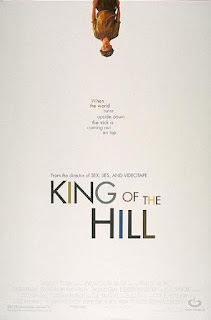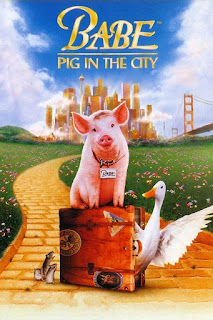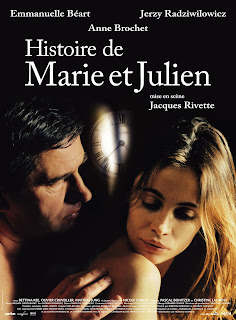May 25th: KING OF THE HILL (Steven Soderbergh, 1993)
NOTE: This film will be projected in the high-definition Blu-ray format.
During The Great Depression, a young boy is left to live alone after circumstance sends his family members off in different directions, having to rely on his wits and imagination to endure.
Writer-director Steven Soderbergh's 1989 debut Sex, Lies, and Videotape was a major event in modern American cinema, coming out of nowhere to become an art-house hit, winning top honors (Palme d'Or) at the Cannes Film Festival, and putting fledgling studio Miramax at the forefront of independent film distribution.
After the critical and commercial failure of his bizarre meta-thriller Kafka, Soderbergh changed gears for his first film funded by a big studio, Universal via their new independent division Gramercy Pictures. He adapted A.E. Hotchner's memoir King of the Hill, based on the author's own experience growing up during the Depression in St. Louis, Missouri, the rights secured personally by Robert Redford for his own production company.
Soderbergh was mostly faithful to the source, his one key decision to do without narration despite the book's first-person voice. Hotchner provided additional, extraneous material not present in his original recollection, and Soderbergh compressed certain characters into new creations.
With a modest budget of $8 million, the film was shot on location in St. Louis and across the Mississippi river in Alton, Illinois, Hotchner often present serving as an advisor. The Midwestern shoot was another reason for very little studio interference. The production design by Gary Frutkoff and cinematography by Elliot Davis intentionally avoided bright, primary colors, influenced partially by the paintings of Edward Hopper.
The cast is headed by Jesse Bradford (Bring It On, TV's The West Wing), in his first starring role, joined by fellow newcomer Adrien Brody (Oscar winner for The Pianist), Dutch actor Jeroen Krabbé (The Fugitive, Immortal Beloved), monologuist Spalding Gray (Swimming to Cambodia), Karen Allen (Raiders of the Lost Ark), and a young Katherine Heigl in her second film appearance.
The film premiered at the Cannes Film Festival, where its old fashioned aesthetic failed to make much noise. It was received very positively by American critics, but did not turn a profit. Its equally- neglected follow-up The Underneath led Soderbergh to a major career evaluation and overhaul and eventual resurgence in the late 1990s, though many feel King of the Hill remains one his his strongest works.
Running time is 100 minutes.
After the critical and commercial failure of his bizarre meta-thriller Kafka, Soderbergh changed gears for his first film funded by a big studio, Universal via their new independent division Gramercy Pictures. He adapted A.E. Hotchner's memoir King of the Hill, based on the author's own experience growing up during the Depression in St. Louis, Missouri, the rights secured personally by Robert Redford for his own production company.
Soderbergh was mostly faithful to the source, his one key decision to do without narration despite the book's first-person voice. Hotchner provided additional, extraneous material not present in his original recollection, and Soderbergh compressed certain characters into new creations.
With a modest budget of $8 million, the film was shot on location in St. Louis and across the Mississippi river in Alton, Illinois, Hotchner often present serving as an advisor. The Midwestern shoot was another reason for very little studio interference. The production design by Gary Frutkoff and cinematography by Elliot Davis intentionally avoided bright, primary colors, influenced partially by the paintings of Edward Hopper.
The cast is headed by Jesse Bradford (Bring It On, TV's The West Wing), in his first starring role, joined by fellow newcomer Adrien Brody (Oscar winner for The Pianist), Dutch actor Jeroen Krabbé (The Fugitive, Immortal Beloved), monologuist Spalding Gray (Swimming to Cambodia), Karen Allen (Raiders of the Lost Ark), and a young Katherine Heigl in her second film appearance.
The film premiered at the Cannes Film Festival, where its old fashioned aesthetic failed to make much noise. It was received very positively by American critics, but did not turn a profit. Its equally- neglected follow-up The Underneath led Soderbergh to a major career evaluation and overhaul and eventual resurgence in the late 1990s, though many feel King of the Hill remains one his his strongest works.
Running time is 100 minutes.










Comments
Post a Comment